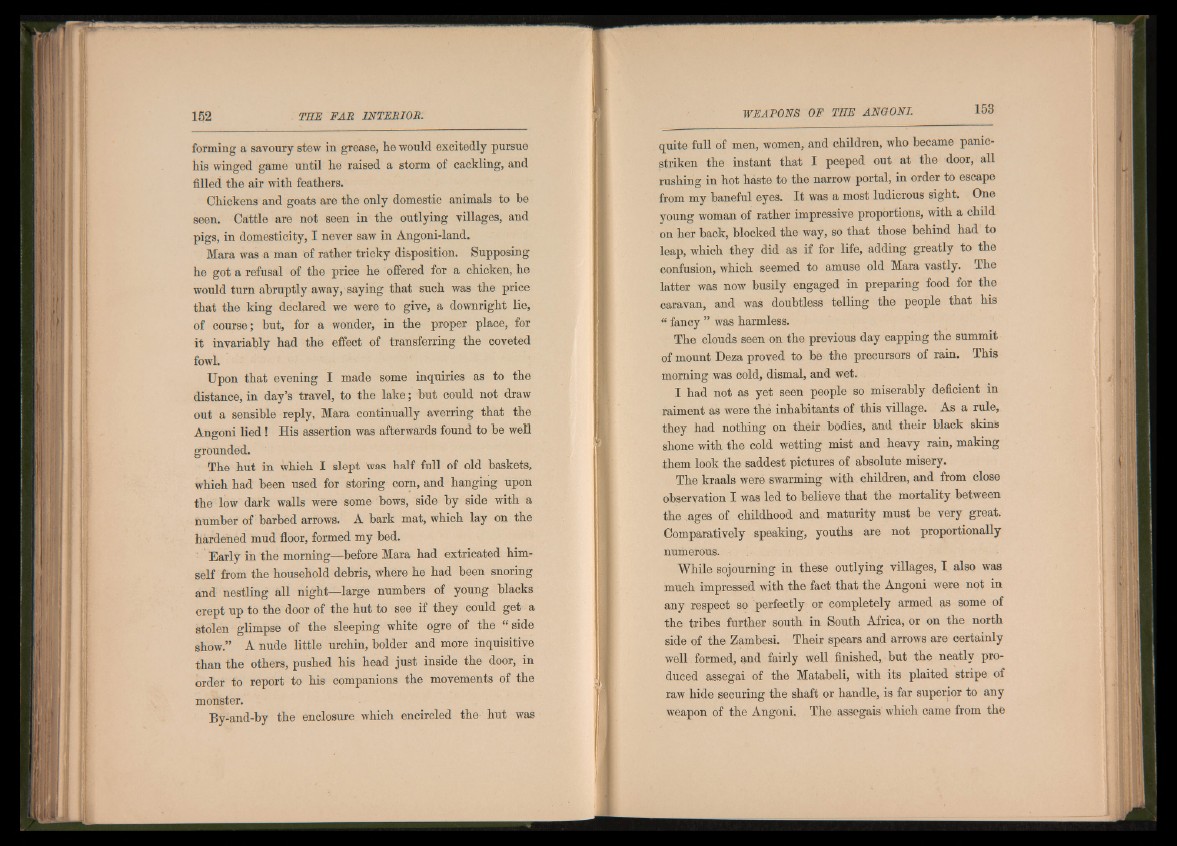
forming a savoury stew in grease, he would excitedly pursue
his winged game until he raised a storm of cackling, and
filled the air with feathers.
Chickens and goats are the only domestic animals to be
seen. Cattle are not seen in the outlying villages, and
pigs, in domesticity, I never saw in Angoni-land.
Mara was a man of rather tricky disposition. Supposing
he got a refusal of the price he offered for a chicken, he
would turn abruptly away, saying that such was the price
that the king declared we were to give, a downright lie,
of course; but, for a wonder, in the proper place, for
it invariably had the effect of transferring the coveted
fowl.
Upon that evening I made some inquiries as to the
distance, in day’s travel, to the lake; but could not draw
out a sensible reply, Mara continually averring that the
Angoni lied ! His assertion was afterwards found to be well
grounded.
The hut in which I slept Was half full of old baskets,
which had been used for storing com, and hanging upon
the low dark walls were some bows, side by side with a
number of barbed arrows. A bark mat, which lay on the
hardened mud floor, formed my bed.
Early in the morning—before Mara had extricated himself
from the household debris, where he had been snoring
and nestling all night—large numbers of young blacks
crept up to the door of the hut to see if they could get a
stolen glimpse of the sleeping white ogre of the “ side
show.” A nude little urchin, bolder and more inquisitive
than the others, pushed his head just inside the door, in
order to report to his companions the movements of the
monster.
By-and-by the enclosure which encircled the hut was
quite full of men, women, and children, who became panic-
striken the instant that I peeped out at the door, all
rushing in hot haste to the narrow portal, in order to escape
from my baneful eyes. I t was a most ludicrous sight. One
young woman of rather impressive proportions, with a child
on her back, blocked the way, so that those behind had to
leap, which they did as if for life, adding greatly to the
confusion, which seemed to amuse old Mara vastly. The
latter was now busily engaged in preparing food for the
caravan, and was doubtless telling the people that his
“ fancy ” was harmless.
The clouds seen on the previous day capping the summit
of mount Deza proved to be the precursors of rain. This
morning was cold, dismal, and wet.
I had not as yet seen people so miserably deficient in
raiment as were the inhabitants of this village. As a rule,
they had nothing on their bodies, and their black skins
shone with the cold wetting mist and heavy rain, making
them look the saddest pictures of absolute misery.
The kraals were swarming with children, and from close
observation I was led to believe that the mortality between
the .ages of childhood and maturity must be very great.
Comparatively speaking, youths are not proportionally
numerous.
While sojourning in these outlying villages, I also was
much impressed with the fact that the Angoni were not in
any respect so perfectly or completely armed as some of
the tribes further south in South Africa, or on the north
side of the Zambesi. Their spears and arrows are certainly
well formed, and fairly well finished, but the neatly produced
assegai of the Matabeli, with its plaited stripe of
raw hide securing the shaft or handle, is far superior to any
weapon of the Angoni, The. assegais which came from the